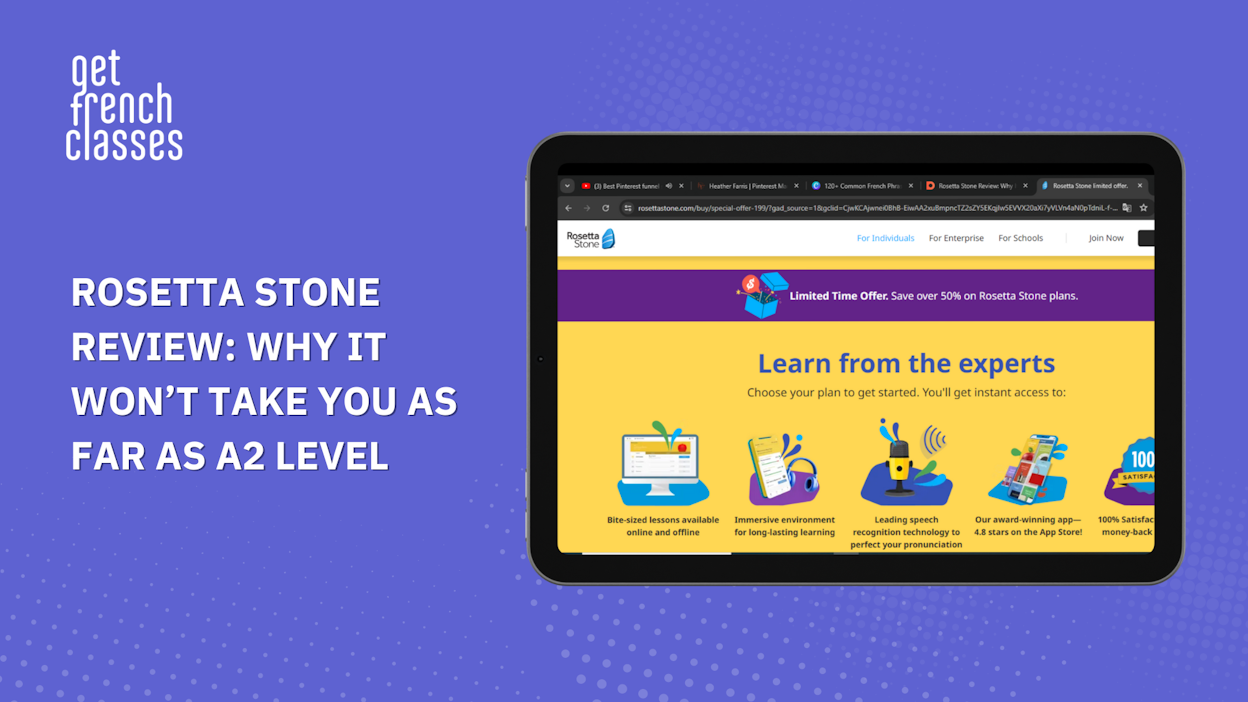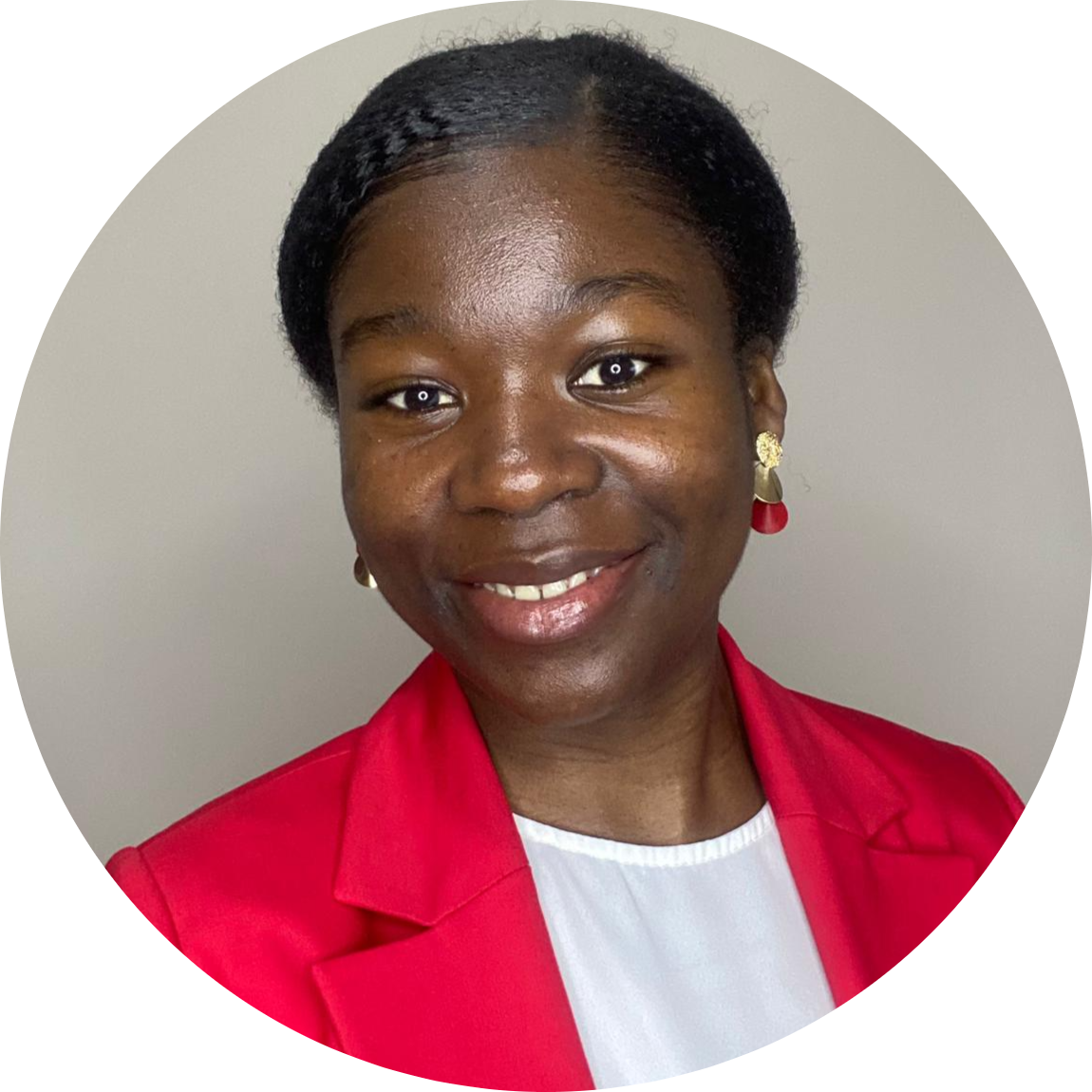So, you're about to purchase a Rosetta Stone license and want to know if it's a good investment.
In this Rosetta Stone review, I'll share my experience learning Spanish with the Rosetta stone app and analyze how it has evolved over the years.
What’s Rosetta Stone, and why is it on your radar?
Rosetta Stone is not a language-learning software like the others; it's the biggest one in the game—practically a household name.
Rosetta Stone has been around since 1992. Yes, you read that right; it predates the smartphone era by a long shot.
They've been in the game longer than many of us have been alive, and they've adapted to the times, transitioning from CD-ROMs to web-based platforms and mobile apps.
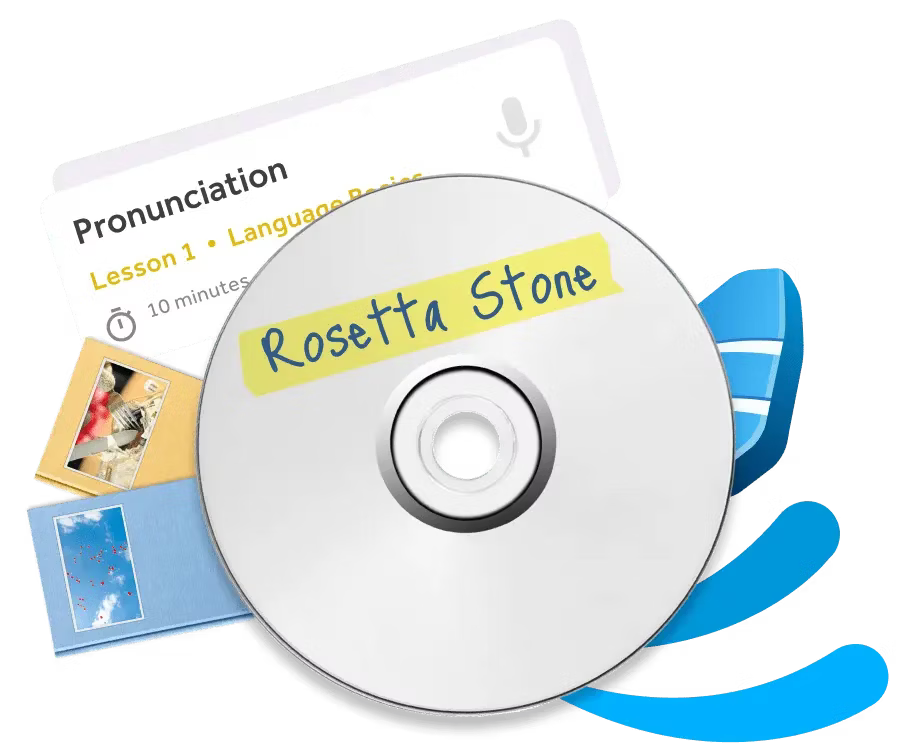
Currently, Rosetta Stone offers courses in 25 languages, including popular choices like Spanish, French, and Mandarin Chinese, as well as less commonly taught languages like Vietnamese and Turkish.

But here's where it gets interesting: Rosetta Stone is no longer a standalone app or language learning software. It's the face of a much larger empire. The parent company, Rosetta Stone Inc., has its fingers in many pies.
They own Wyzant, a platform for live online tutoring. They've acquired Emmersion.com, which focuses on language assessments. They even run Ingles.com, targeting Spanish speakers learning English. It's a whole ecosystem of language-learning products.

However, in this Rosetta Stone review, I'm zeroing in specifically on the Rosetta Stone language learning app. That's the core product, the one that started it all, and the one most people think of when they hear the name.
Now, you might be wondering why I'm bothering to review such a well-established product. Well, Rosetta Stone has been on my radar for years, and I bet it's been on yours too. Back in the day, they launched an aggressive TV advertising campaign that was hard to ignore.

This marketing blitz put Rosetta Stone firmly in the public consciousness. It became synonymous with language learning for many people. Even now, years later, when someone decides to learn a new language, Rosetta Stone is often one of the first options they consider.
But popularity doesn't always equal effectiveness. That's why I've taken the time to dive deep into Rosetta Stone, to see if it lives up to the hype. In the following sections, I'll share my findings and help you decide if this veteran of the language-learning world is really worth your time and money.
What’s Rosetta Stone’s promise, and why is it based on a fallacy?
When you first come across Rosetta Stone, you're hit with a barrage of marketing claims about their "revolutionary" immersion method.
They promise that you'll learn a new language the same way you learned your first—naturally, without translations or explanations.
It sounds appealing, doesn't it?
I thought so too, at first. But after diving deep into the research and putting in countless hours with the language learning program, I've come to realize that this promise is built on a fundamental misunderstanding of how adult language acquisition works.
The immersion method claim
Rosetta Stone has it that their method mimics the way children learn their native language. They tout a picture-based system where you're supposed to intuit meaning from context, just like a baby learning to speak. It's a nice story, and I can see why it's attractive.
Who wouldn't want to absorb a new language effortlessly, like a sponge? Especially since we're all after shortcuts.
But here's the thing: Yes, Rosetta Stone does immerse you in the target language from the get-go.
But it's a shallow immersion, confined to a series of disconnected images and phrases. It's not the rich, contextual immersion that a child experiences in their daily life. When you use Rosetta Stone, you're not living the language; you're just looking at pictures on a screen.
In comparison, a child is totally immersed in the language. Everyone around them, from siblings to the father and mother, aunties, cousins, uncles, and grandparents, speaks the language with different accents and intonations.
And because of this setup, the child has no other option than to consume like a sponge. Moreover, because the child doesn't speak or understand any other language, they only process new information based on the one language they're learning.
On the other hand, when you're an adult, you probably speak 2 languages already, and it becomes difficult to really immerse yourself unless you're in a restrictive and immersive environment that allows you to.
Now, imagine just being immersed in a language just because you looked at some pictures and repeated the associated words—all while your entire environment is speaking another language than what you're learning.
Why adult language acquisition differ from children's
This is where the fallacy of Rosetta Stone's promise becomes clear.
You see, as an adult, your brain is fundamentally different from a child's when it comes to language learning.
When you were a baby, your brain was a blank slate, ready to absorb any language structure it encountered. But now? Your adult brain is hardwired with the patterns of your native language. You can't simply erase that and start over like Rosetta Stone seems to think you can.
Moreover, as an adult, you have analytical skills that children don't. You can understand grammatical concepts, make connections between languages, and use your existing knowledge to accelerate learning.
Rosetta Stone's method ignores these advantages, treating you like a child when you're anything but.
I've tested this myself. When using Rosetta Stone, I found myself constantly wanting to ask "Why?" Why is this word order different? Why does this ending change?
The language learning program offers no explanations, expecting you to figure it out on your own. It's frustrating and, frankly, inefficient.
Don't get me wrong—immersion can be a powerful tool in language learning. But it needs to be real immersion, coupled with structured instruction that takes advantage of your adult cognitive abilities. Rosetta Stone's "immersion" is a pale imitation that fails to leverage your full learning potential.
My experience with Rosetta Stone and other language learners’ perspectives
My journey with Rosetta Stone began in 2016. I was looking for an affordable alternative to private and group classes, and Rosetta Stone seemed to fit the bill.
At the time, I used rosetta stone alongside Duolingo, thinking I'd found the perfect combination for language learning on a budget. But reality hit hard.
Neither Rosetta Stone nor Duolingo could help me achieve my language goals, and I eventually bit the bullet and paid for live classes.
Here's what I discovered about Rosetta Stone during my time with the language learning program.
Heavy reliance on rote memorization
Rosetta Stone seems to want users to treat languages like music—memorize the notes and play them back.
But here's the thing: a language is not music. You can't just mix and combine words and expect them to make sense.
Sure, this technique of memorizing and reciting might work to an extent in real-life conversations, but it's far from ideal.
For the mind to output vocabulary in a structured and contextual manner, the words need to be connected to a why and a how.
It's important to understand why "How are you?" is structured the way it is and why "How do you do?" means "Nice to meet you."
But unfortunately, Rosetta Stone's content is mainly just that—content to memorize.
As a result, every time I've met someone using Rosetta Stone, I've noticed they always struggle to remember the vocabulary they've memorized.
It's like they've learned a bunch of disconnected puzzle pieces but can't figure out how to put them together into a coherent picture.
A lack of context and cultural significance of the materials
As adults, we always want to know the reason behind things, the logic.
In which context should we use this grammar rule? How does this phrase change meaning in different situations?
More importantly, languages aren't just words. Context and culture are what make languages complex and fascinating.
It's the context that makes "spend time" mean "be in prison" in some situations, versus simply meaning what it literally says. It's a cultural understanding that makes "What a douche" sound like a friendly joke among friends but an insult in other contexts.
Rosetta Stone, however, falls short in this crucial area. The program does not focus on context and cultural significance. Instead, they're just combining mere words, leaving you with a superficial understanding of the language.
This approach can help you memorize individual words or phrases, but it won't give you the deep understanding you need to truly communicate in your target language. You'll be able to say the words, but you won't necessarily know when or how to use them appropriately.
This lack of cultural context in Rosetta Stone can also lead to some serious miscommunications.
Let me give you a prime example from Japanese, a language known for its complex levels of politeness.
In Japanese, there's a fine line between being polite and being overly polite to the point of embarrassing the people you're speaking with. It's a nuance that Rosetta Stone completely fails to address.
As a result, when you're speaking with Japanese native speakers, they can immediately tell that you're just a grammarian—someone who's learned the words but not the culture, which can be perceived as an insult.
Even worse, this lack of cultural understanding can actually cause you to come across as rude, even when that's the complete opposite of your intention.
You'll think you're being incredibly polite by using the most formal language you've learned, but in certain contexts, it will make others uncomfortable or even offend them.
I've seen this happen time and time again with Rosetta Stone users. They've memorized the words and phrases, but they lack the cultural intelligence to use them appropriately.
It's like they're walking through a minefield of social faux pas, never quite sure when they might step on a cultural landmine.
Rosetta Stone's failure to address these cultural nuances is, in my opinion, one of its biggest shortcomings.
No update or progress whatsoever in years
Learning languages through grammar rules is great if you're learning for professional purposes.
But let's be real—if you're like many of us and want to use your language in everyday conversations, you need to understand that natives speak a whole different game.
Rosetta Stone, unfortunately, seems stuck in a time warp, teaching a version of language that's often outdated and overly formal.
Take French, for instance. Most natives don't pronounce words in full like we learn them with Rosetta Stone.
“Je suis” becomes “chui,” “je ne sais pas” morphs into "chais pas," and "qu'est-ce que c'est" is often shortened to “keskes”.
These contractions are essential for sounding natural, but you won't find them in Rosetta Stone's rigid curriculum.
And that's just the surface level. When you get into younger demographics, it gets even trickier with slang. Not knowing these can leave you sounding like a textbook, or worse, get you made fun of or excluded in certain social circles.
For example, in modern French:
-
"Cigarette" becomes "cloppe"
-
"Maison" transforms to "son-mai"
-
"Maman" can be "ma-ter," "daronne," or "ronne"
Rosetta Stone, however, seems to have stayed the same for years. They haven't even attempted to update their content to reflect new trends, like Gen Z vocabulary.
The UI and UX have remained stagnant, and the content hasn't improved an inch. It's like they're teaching you to use a rotary phone in the age of smartphones.
This lack of progress is a massive disservice to language learners. Language is a living, breathing entity that evolves constantly. By not keeping up with these changes, Rosetta Stone is essentially teaching you a version of the language that might have been current when the program was first developed but is now out of touch.
Moreover, this stagnation extends beyond just vocabulary. The way people communicate has changed dramatically with the rise of social media and instant messaging. These platforms have given birth to new linguistic conventions and expressions that Rosetta Stone completely ignores.
A focus on short-term clout and a culture of learning in isolation
One of the main complaints I hear from language learning app users is, "But I don't have anyone to speak with!"
That's because these language learning apps, Rosetta Stone included, promote learning in isolation. They create a bubble where you interact with the app, but not with real people speaking the language.
Rosetta Stone fails to expose learners to more opportunities for practice. Instead of fostering a community of language learners or facilitating connections with native speakers, they favor this isolated learning approach.
What's worse is that they push for short-term gratification. They give you a sense that you're learning something and are on to something just because you're able to match words with pictures or repeat some audio snippets.
It's like giving yourself a pat on the back for knowing the ingredients of a cake without ever having baked one.
This approach might make you feel good at the moment, but it doesn't prepare you for real-world language use. You could rack up points or levels in the language learning app, but that “clout” doesn't translate to actual language proficiency.
In my experience, this isolated learning led to a false sense of confidence. I thought I was making great progress because I was completing lessons and getting high scores.
But when I tried to have a real conversation, I froze. I hadn't developed the skills to think on my feet, listen, and respond in real time.
Moreover, this isolation robs you of one of the most important aspects of language learning: cultural immersion.
Language isn't just about words and grammar; it's about understanding a different way of thinking and a different culture. By learning in isolation, you miss out on the cultural context that gives language its richness and depth.
Rosetta Stone and the rise of the fake polyglot
The advent of language learning apps like Rosetta Stone has given birth to the rise of the fake polyglot.
You've probably encountered them on social media or in casual conversation—those individuals who confidently claim to speak eight, ten, or even more languages.
They claim to learn multiple languages. But when you dig a little deeper, you realize their “fluency” amounts to little more than a handful of memorized phrases and some basic vocabulary.
This trend is particularly troubling because it creates a false narrative about language learning.
It suggests that you can easily achieve true multilingualism with just a few taps on a smartphone screen or a couple of hours with a language learning program like Rosetta Stone.
But let me tell you, as someone who's dedicated years to language learning, it's not that simple.
The problem stems from the gamification of language learning that apps like Rosetta Stone employ. Don't get me wrong, making learning fun isn't inherently bad.
But when the focus shifts from actual proficiency to collecting points, badges, or completing levels, then we've lost sight of the real goal.
I've seen countless examples of this. People who claim to be fluent in Spanish because they've completed all levels of Rosetta Stone but struggle to order a meal in a real Spanish restaurant.
Or those who list five languages in their LinkedIn profile but can barely string together a coherent sentence in any of them.
This isn't just a harmless exaggeration. It devalues the efforts of true language learners and creates unrealistic expectations for those starting their language learning journey.
It suggests that language learning is a sprint rather than a marathon, a game to be won rather than a skill to be cultivated over time.
Don't misunderstand me. I'm not saying Rosetta Stone and similar apps are entirely without merit. They can be useful tools for introducing basic concepts and vocabulary.
But they should be seen as supplements to a comprehensive language learning approach, not as a one-stop solution for achieving fluency.
Real language proficiency requires dedication, immersion, and practice in real-world contexts. It's about making mistakes, learning from them, and gradually building confidence. It's about understanding not just the words, but also the culture and mindset behind them.
I still believe Rosetta Stone is way better than Duolingo
This goes beyond the simple answer to the 'How much does Rosetta Stone cost?' question.Despite the criticisms I've leveled at Rosetta Stone, I have to be clear: when compared to Duolingo, Rosetta Stone is still the superior option. Here is why.
First and foremost, Rosetta Stone's approach to language learning is more serious and structured.
While Duolingo often feels like a game designed for toddlers, Rosetta Stone at least attempts to create an immersive language experience. This difference is important for adult language learners who are serious about making progress in their target language.
Rosetta Stone's content is more geared towards helping beginners expose themselves to new languages in a somewhat practical way.
The phrases and sentences you learn are more likely to be useful in real-life situations compared to Duolingo's often absurd and disconnected sentences.
You're less likely to learn how to say “The elephant is driving a car” and more likely to learn useful phrases like “Where is the bathroom?” or “Can you help me?”
Moreover, Rosetta Stone's focus on pronunciation and speaking from the get-go is a significant advantage.
Their speech recognition technology, even though it is not perfect, encourages learners to speak out loud and practice their pronunciation to the very least. That's a language learning aspect that Duolingo neglects.
Another point in Rosetta Stone's favor is its attempt at teaching through images rather than direct translation. While it's not perfect and often lacks cultural nuance, this approach is better.
Duolingo, on the other hand, relies heavily on translation exercises, which can lead to the habit of constantly translating in your head rather than thinking in the target language.
Rosetta Stone also offers a more comprehensive learning experience. Their lessons build on each other in a more logical progression, introducing grammar concepts and vocabulary in a somewhat structured manner. Duolingo's learning path can feel more random and less cohesive.
That being said, it's important to remember that being better than Duolingo doesn't make Rosetta Stone perfect. It's like being the tallest person in a room full of short people—you might stand out, but it doesn't necessarily make you tall in the grand scheme of things.
Both Rosetta Stone software and the one of Duolingo have their limitations, and neither will lead you to true fluency on their own. However, if I had to choose between the two, I would recommend Rosetta Stone for serious language learners. It provides a more solid foundation and a learning experience that's closer to traditional language learning methods.
Should you even use Rosetta Stone to learn a language?
After all this critique, you might be wondering if Rosetta Stone has any place in your language-learning journey. The answer is yes, but with some important caveats.
Rosetta Stone can be an excellent tool for beginners who are looking for initial exposure to a new language. It's particularly useful for:
-
Building basic vocabulary: Rosetta Stone's image-based learning can help you quickly associate words with their meanings.
-
Getting a feel for sentence structure: Through repetition and context, you can start to intuit basic grammatical patterns.
-
Developing initial listening skills: The program exposes you to native speaker pronunciations from the start.
-
Creating a daily language learning habit: Rosetta Stone's structured lessons can help you establish a routine.
However, you need to understand that Rosetta Stone alone is unlikely to take you beyond an A2 level on the Common European Framework of Reference for Languages (CEFR). This means you'll be able to handle basic communications, but you won't achieve fluency or be able to engage in complex conversations.
For intermediate learners, Rosetta Stone's utility becomes more limited. At this stage, you need more complex and nuanced language input than Rosetta Stone typically provides. You also need more opportunities for output—actually using the language you're learning in conversation or writing.
Intermediate learners might find that Rosetta Stone:
-
Doesn't introduce enough advanced vocabulary
-
Lacks explanation of more complex grammatical structures
-
Doesn't provide enough context for idiomatic expressions
-
Fails to address the cultural nuances that become increasingly important at higher levels of language proficiency
Get French Classes: A way better alternative to Rosetta Stone if you’re learning French
Even though Rosetta Stone software is a step up from Duolingo, it still falls short in many areas crucial for effective language learning. And if you're specifically looking to learn French, Get French Classes is a way better alternative.
As someone who has experienced the frustrations of more than one language learning software firsthand, I can confidently say that Get French Classes addresses many of the shortcomings of platforms like Rosetta Stone and Duolingo.

Here's why I believe it's a game-changer for French learners:
Structured, immersive learning path
Get French Classes goes beyond a simple curriculum—it offers a meticulously crafted journey through the French language to help you develop skills the foreign language like a native speaker.
Each course is designed with a specific real-life situation in mind, such as navigating a bakery, office, or social event. This approach ensures that what you're learning is immediately applicable to your daily life.
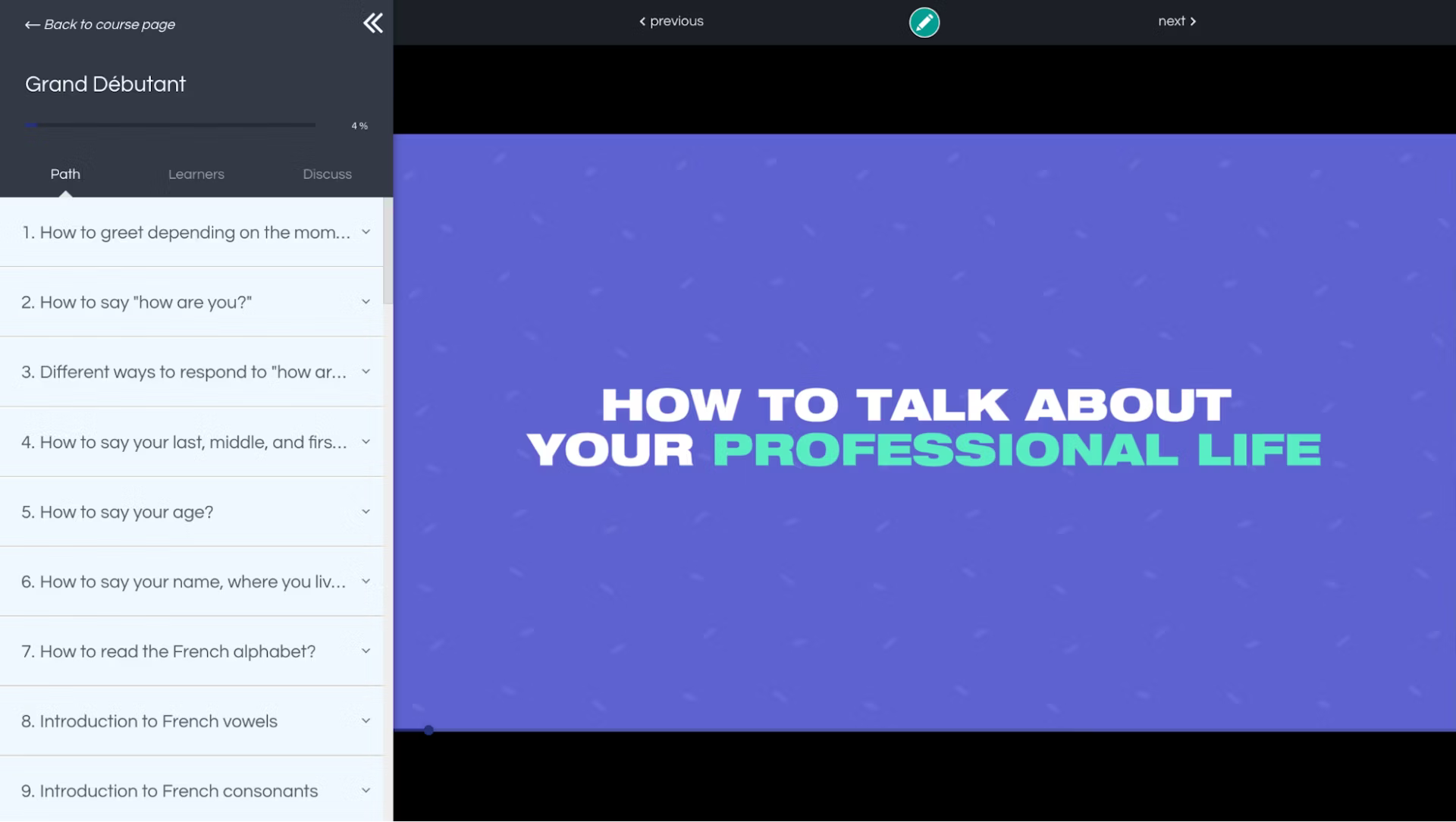
The structure is carefully planned to build upon previous lessons, creating a logical progression from beginner to advanced levels. But it's not just about vocabulary and grammar.
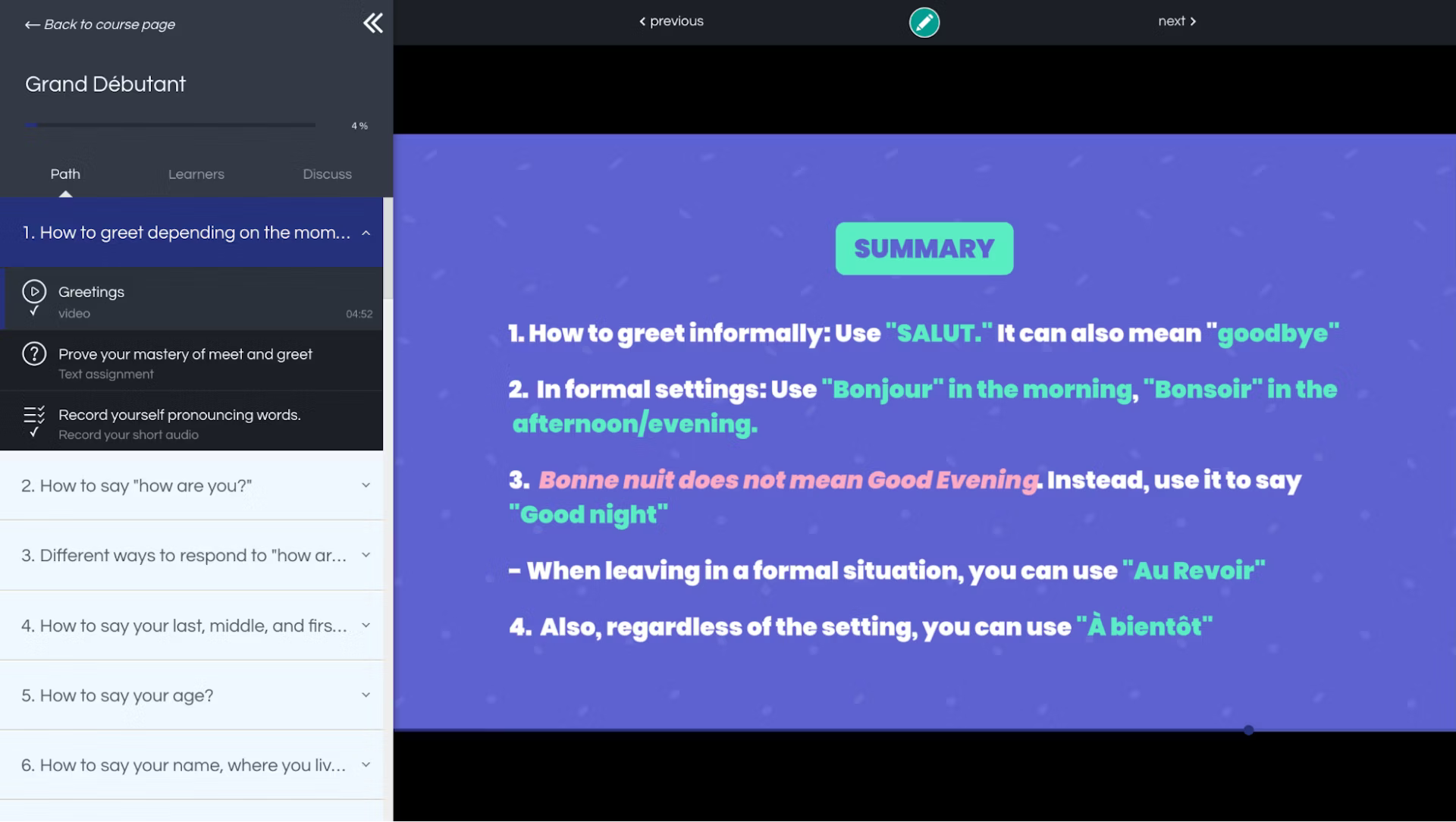
Each lesson is infused with cultural insights, local customs, and even regional variations in French. For instance, a lesson about ordering in a café might include:
-
The etiquette of French dining
-
Common local expressions you'll hear in a café
-
Differences between ordering in Paris versus Marseille
-
The cultural significance of café life in France
This immersive approach helps you not just speak French, but think in French, understanding the cultural context behind the words you're using.
Balance of self-study and live interaction
At Get French Classes, we believe that the best learning experience happens when you blend self-paced learning with invaluable live interaction.
So, we designed our program around that philosophy.
Here's how:
Self-study components:
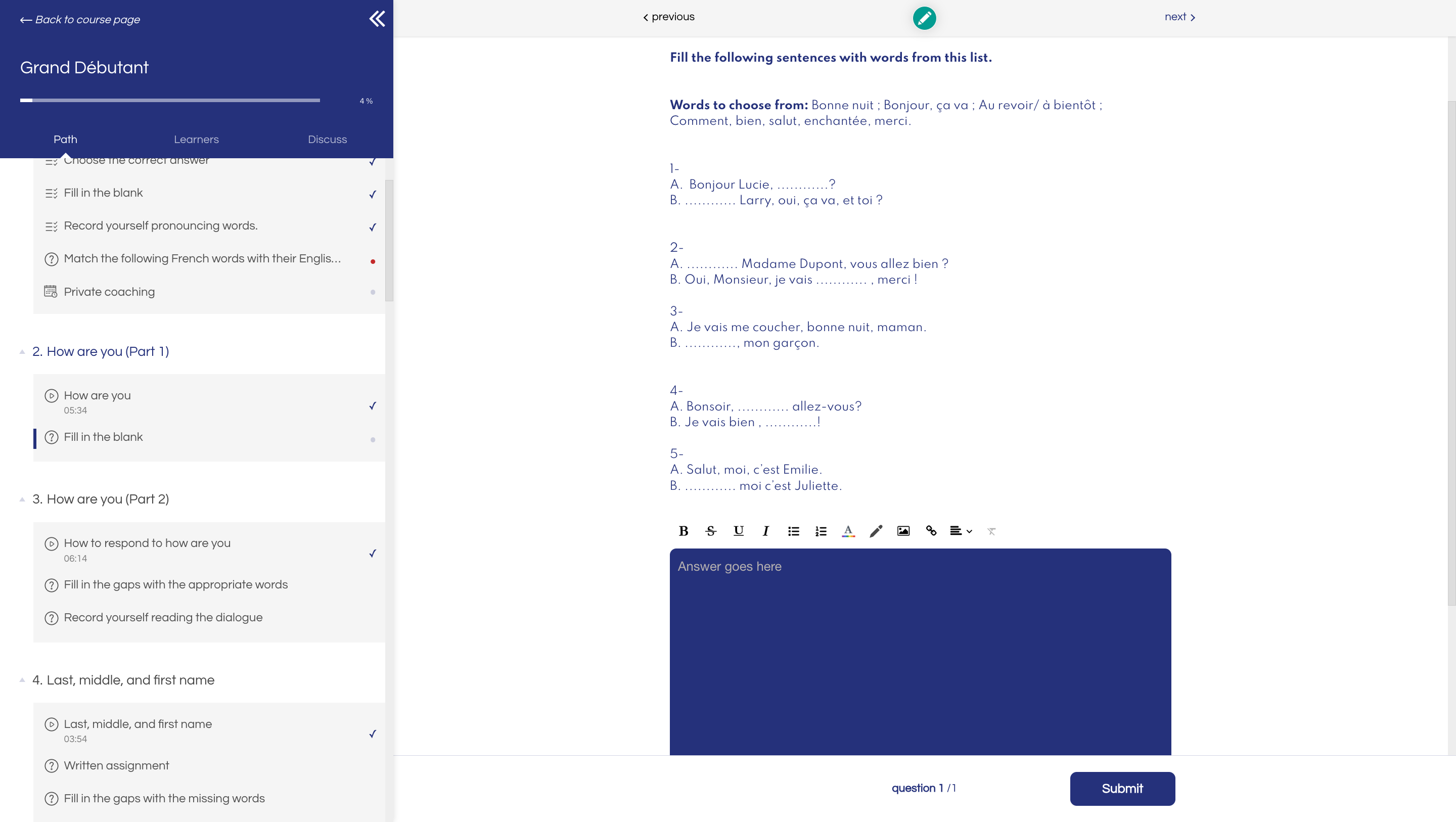
-
50+ interactive video lessons that allow you to practice pronunciation and receive instant feedback
-
100+ carefully designed assignments that apply what you've learned to real-world scenarios
-
A vast library of supplementary learning materials, including audio content (your audio companion), cultural notes, and grammar explanations
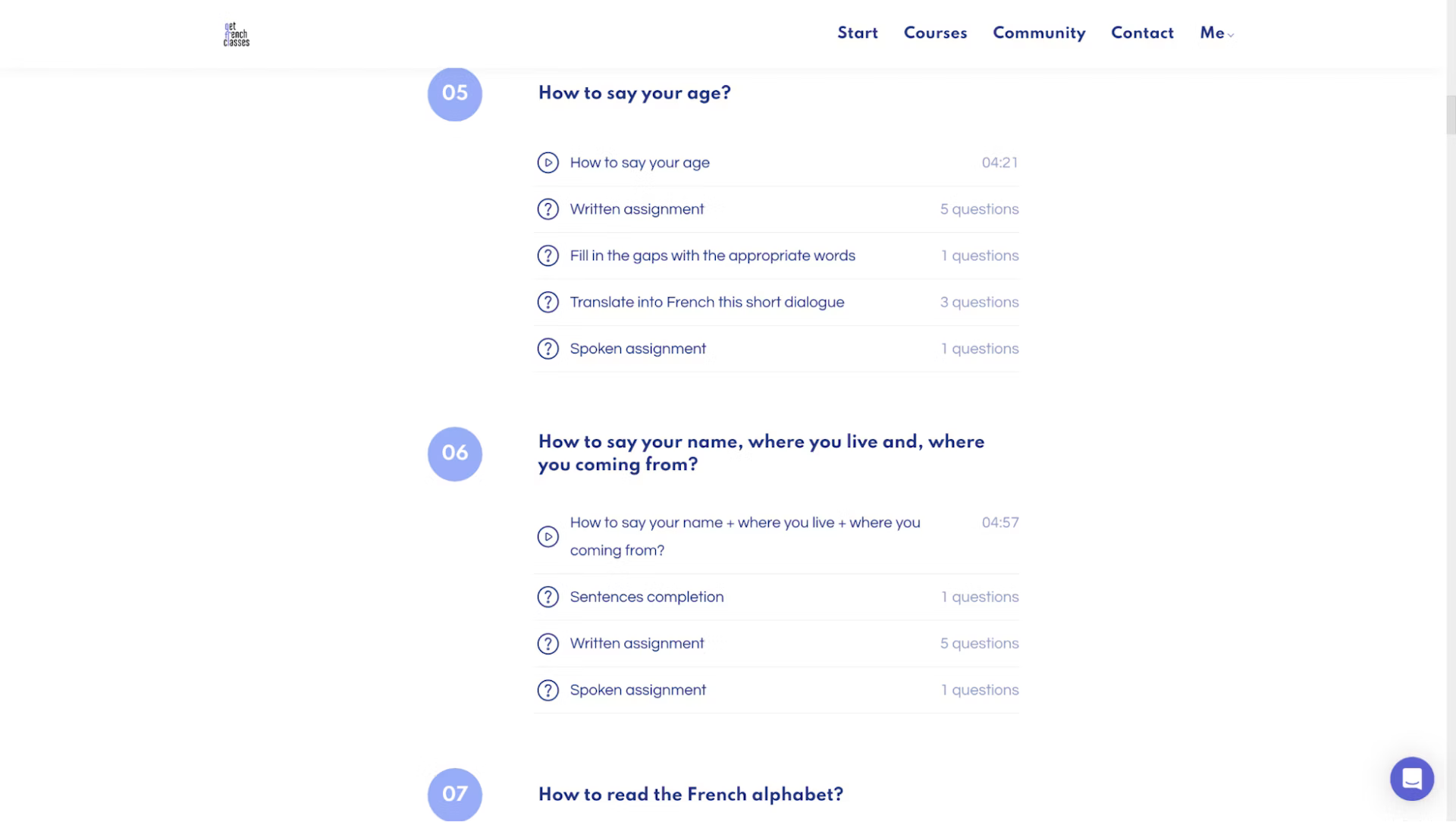
Live interaction:
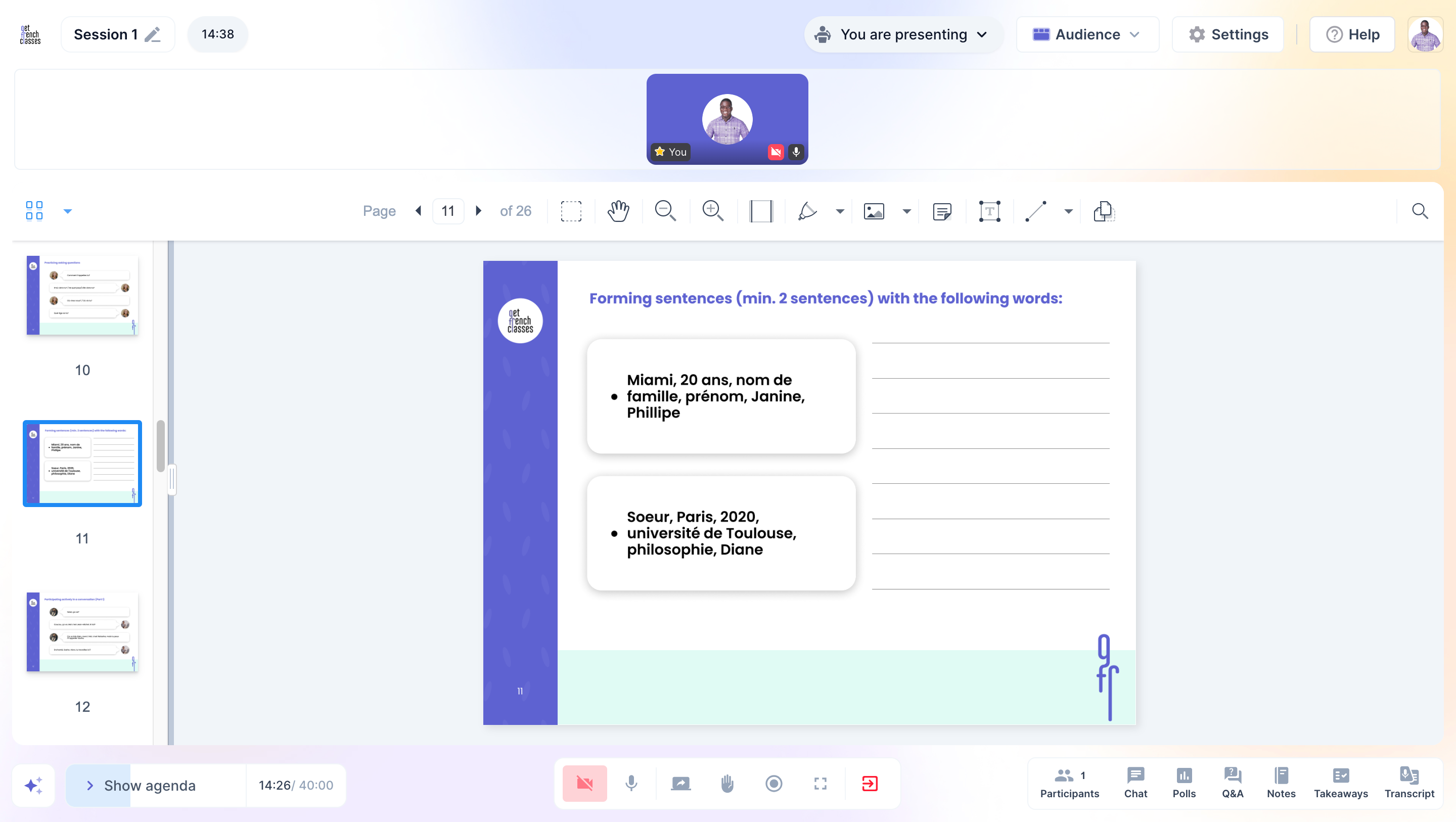
-
6 hours of private classes tailored to your specific needs and learning style
-
6 hours of group classes offering opportunities for dynamic conversation practice, debates, and role-playing exercises
-
Live sessions with French tutors (native speakers) who can explain nuances, answer questions, and provide immediate feedback
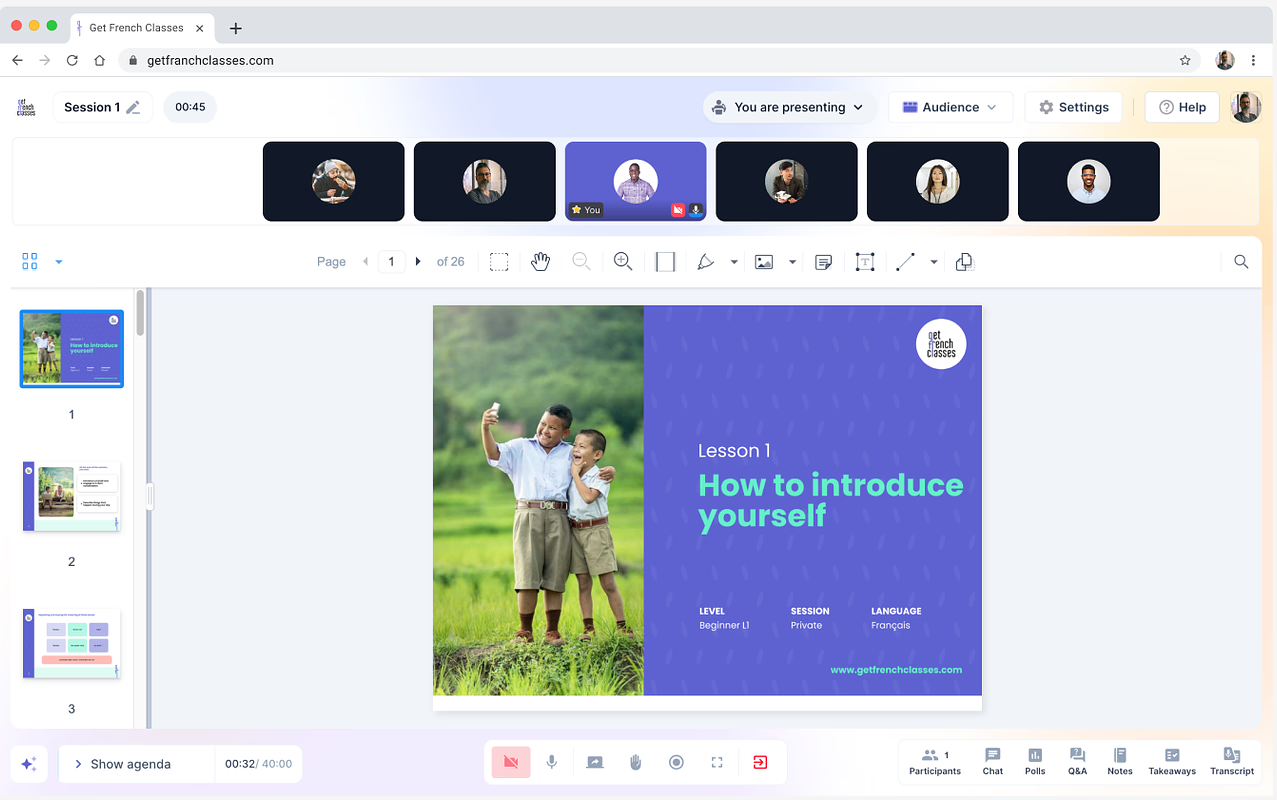
This balanced approach ensures that you're not just memorizing phrases, but truly understanding and internalizing the target language. The self-study components allow you to learn at your own pace, while the live interactions provide the crucial practice and feedback needed to truly master French.
Here are some of our tutors:
Community and accountability
We also created a robust system to keep you motivated and engaged throughout your learning journey:
Learning pods
You're placed in a carefully curated group of six students at similar levels, guided by a dedicated tutor.
These pods engage in:
-
Weekly discussions on various topics
-
Cultural exchange activities
-
Virtual "field trips" to French-speaking regions via video tours
-
Collaborative projects that require using French in practical ways
Accountability partners
You're paired with another learner to:
-
Check-in on each other's progress regularly
-
Practice speaking French together outside of class time
-
Motivate each other to stick to learning goals
Community forum
A broader platform where all learners can:
-
Share resources and learning tips
-
Organize language exchange meetups
-
Plan trips to French-speaking countries
-
Discuss French culture, movies, books, and current events
Progress tracking
The platform provides detailed analytics on your learning progress, including:
-
Time spent on different activities
-
Improvement in various skill areas (speaking, listening, reading, writing)
-
Achievement of specific learning milestones
Here's what some of our learners have to say:

As a busy mom and professional, learning French has been complicated for me. But since I started learning with Get French Classes, I have seen my French improve FAST. Through the lessons, I not only get to practice every day, but I also have more opportunities than before. I can practice with my advisor, private tutor, and other learners like me.

What I like the most about the program is that all my tutors are native speakers. They do help me not only understand the French language, but also the culture and the nuances of some words and expressions. And mostly, the live sessions are engaging and fun.

I chose Get French Classes because their teaching materials and content are incredibly rich, going from everyday expressions to more specialized ones. I also get many opportunities to interact with tutors, and that has a huge impact on my fluency.
I've tried learning French on my own before, but nothing compares to this program. The combination of video lessons, live tutoring sessions, and group practice made learning French enjoyable and effective.
Affordability without compromise
Get French Classes' pricing is for all budgets. At $307 for a comprehensive course, we offer exceptional bang for your buck.
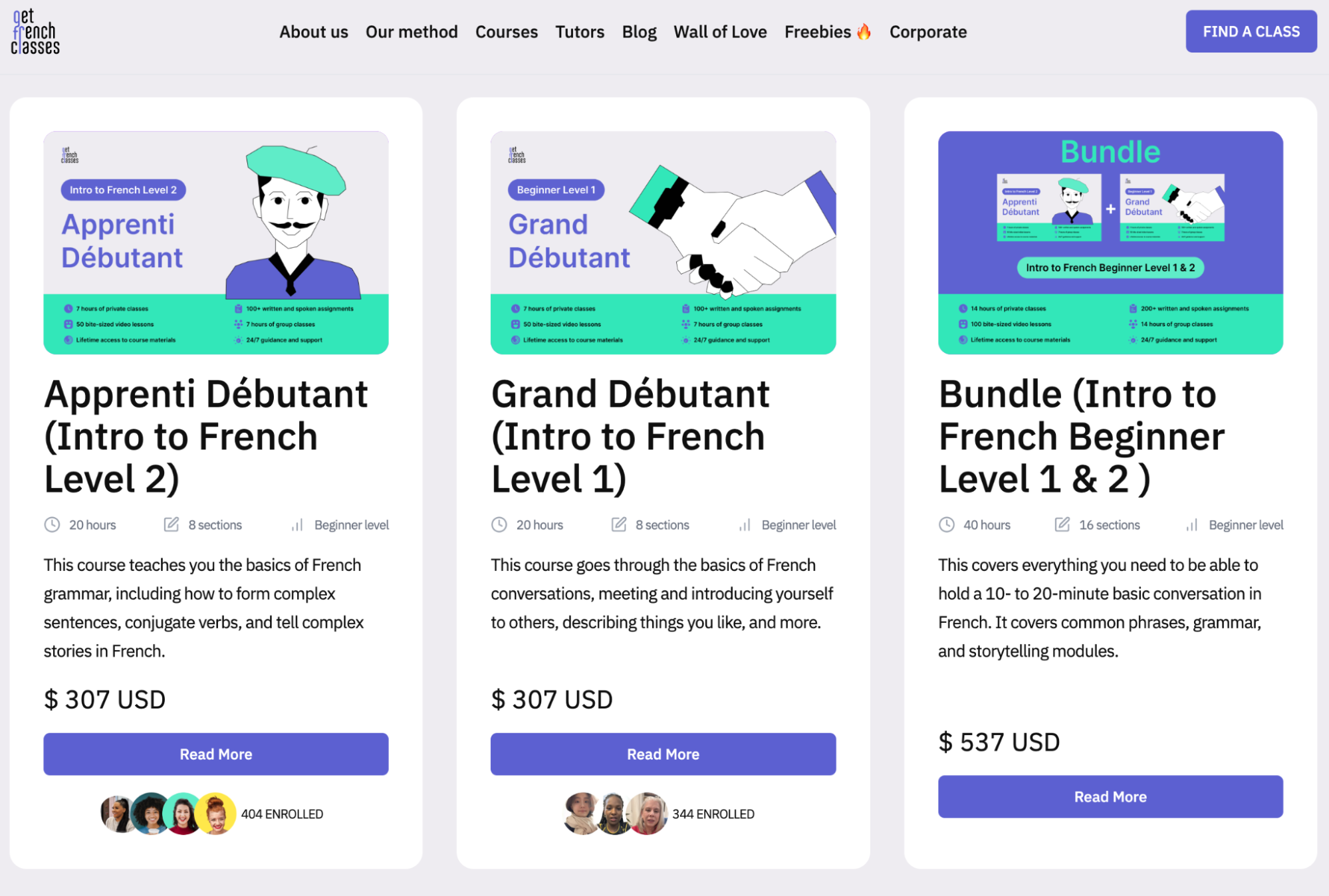
Here's what makes it stand out:
-
Lifetime access: Unlike many platforms that limit access, you get lifetime access to course materials. This allows you to revisit and review even after you've completed the language program.
-
All-Inclusive pricing: There are no hidden fees or upsells. The price includes all video lessons (cultural videos included), assignments, private tutoring, group classes, and community access.
-
Job board access: Get French Classes provides access to a job board featuring French-speaking positions, adding tangible career value to your learning.
-
Recognized certificates: After passing our DELF DALF exam, you will receive certificates that many employers and educational institutions will recognize, giving your language abilities more professional credibility.
-
Free updates: As the course content is updated and improved, you get access to these updates at no extra cost.
When compared to private tutoring (which can cost $50–$100 per hour) or immersion trips (easily running into thousands of dollars), Get French Classes offers a cost-effective path to fluency without sacrificing quality or comprehensiveness.
Flexible schedule
The way we designed our program makes it suitable for everyone, even people with tight schedules.
Here's how.
-
Bite-sized lessons: Core lessons are broken down into 5-10 minute segments, making it easy to fit learning into even the busiest schedule.
-
24/7 access: All course materials are available round the clock, allowing you to learn whenever it suits you best.
-
Flexible live sessions: Private and group tutoring sessions can be scheduled at your convenience, with options available across different time zones.
-
Microlearning opportunities: Daily challenges and quick exercises that can be completed in just a few minutes, perfect for squeezing in practice during short breaks.
This level of flexibility ensures that your French learning fits seamlessly into your life, no matter how busy or unpredictable your schedule may be.
Rosetta Stone review: My verdict
From this Rosetta stone review, the take away is that Rosetta Stone can be a useful tool for beginners seeking initial exposure to a new language or other languages than their native language. Use it as a supplement to other learning methods, particularly for building basic vocabulary and getting a feel for sentence structures. However, for those aiming for fluency or advanced proficiency, it falls short.
But if you're learning French, are on a budget, and want to hit your fluency goals faster, Get French Classes is the ideal choice. Every one of our language courses includes:
-
6 hours of private classes : This allows for personalized attention and feedback, helping you address your specific challenges and accelerate your progress.
-
6 hours of group classes : These sessions provide opportunities for real-world conversation practice, improving your fluency and confidence in speaking French.
-
50 video lessons : This helps you practice daily, reinforcing what you've learned and introducing new concepts in a structured, easy-to-follow format.
-
100+ assignments (writing and speaking) : These exercises ensure you're actively using the language, not just passively absorbing it. They help cement your learning and improve your ability to express yourself in French.
-
A community of learners : This provides motivation, accountability, and opportunities for language exchange outside of formal lessons.
With Get French Classes, you're not just memorizing words and phrases; you're immersing yourself in the language and culture, gaining practical skills that you can use in real-life situations.
Our comprehensive approach addresses all aspects of language learning - speaking, listening, reading, and writing - in a way that Rosetta Stone simply can't match.
